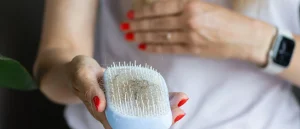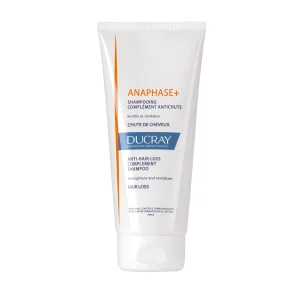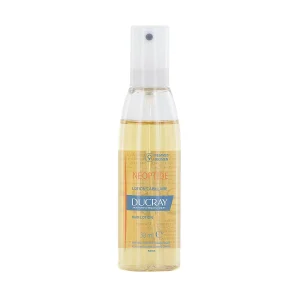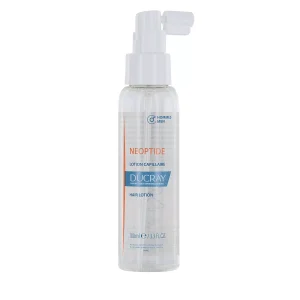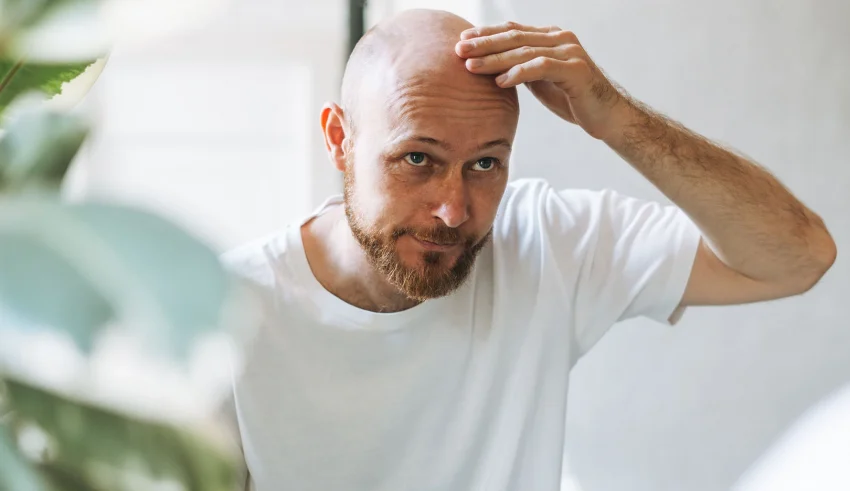
Hair loss is a very common condition that affects both genders and has a negative effect on confidence and self-esteem. But the good news is that there are several treatment options. In this article from The Dermo Lab and in collaboration with the dermatologist Dr. Sameer Zimmo, we will go over some recommendations for the best hair loss treatment for both men and women.
What are the types of hair loss?
According to Dr. Sameer Zimmo, there are 4 types of hair loss: telogen effluvium, androgenetic alopecia, scarring alopecia, and alopecia areata.
- Telogen effluvium
Telogen effluvium occurs when a large number of scalp follicles enter the resting phase of the hair growth cycle, called telogen, without moving to the next growth phase. This causes hair to fall out all over the scalp.
In most of the cases, telogen effluvium does not result in complete baldness, although you may lose 300 to 500 hairs per day and the hair may appear thin, especially at the crown and temples.
- Androgenetic alopecia
Androgenetic alopecia is the most common type of hair loss. Commonly referred to as male pattern hair loss or female pattern hair loss, androgenetic alopecia is hereditary but can be treated with medication or surgery.
- Scarring alopecia
Scarring alopecia is a rare type of hair loss in which inflammation destroys the hair follicles and causes scar tissue to form. Once the scar tissue forms, the hair does not grow back.
Hair loss may start so slowly that symptoms are not noticeable, or the hair may begin to fall out all at once. Other symptoms include severe itching, swelling, and red or white lesions on the scalp that may look like a rash. This type of hair loss can occur at any age and affects both men and women.
- Alopecia areata
Alopecia areata is an autoimmune disease, which means that the body’s immune system attacks healthy tissue, including hair follicles. This causes hair loss and prevents new hair growth.
Hair on the scalp usually falls out in small patches and is not painful. Hair on other parts of the body, including eyebrows and eyelashes, may also fall out. Over time, this condition can lead to complete loss of hair.
How does hair loss occur?
Hair loss can be divided into two main categories: scarring and non-scarring.
As discussed, scarring hair loss is caused by inflammation at the base of the hair follicle. This type of hair loss is often caused by an autoimmune disease. Scarring hair loss often results in redness, flaking, pain, and burning of the scalp.
Non-scarring hair loss is different. In general, non-scarring hair loss can be treated and your hair often grows back. In the case of non-scarring hair loss, it is important to determine the reasons for hair loss. If your hair is falling out, it is often due to some bad hair care habits, such as excessive washing or the use of chemical treatments.
There are many causes for non-scarring hair loss. Here are some of them:
- Stress
- Hormonal changes
- Illness
- Vitamin or iron deficiency
- Age
- Genetics
How can I treat my hair loss?
Dr. Sameer Zimmo states that it is essential to know that the cause of hair loss will determine which treatment to choose.
Most hair loss treatments work for both men and women.
1- Hair loss supplements:
Hair loss supplements can help you regrow your hair. Here are some examples:
- Collagen: These supplements can help improve skin moisture and elasticity. Collagen has become a popular supplement for hair growth.
- Biotin (vitamin B7): Biotin is a long-standing supplement for hair loss.
- Vitamin D: Studies show that people with alopecia areata have lower levels of vitamin D than others. Vitamin D supplementation may help treat inflammation around the hair follicle.
- Zinc: Severe zinc deficiency may be a trigger for hair loss. Supplementation can help treat zinc deficiency and regrow hair.
- Iron: Iron deficiency can contribute to hair loss. Iron supplementation may help regrow your hair. Dr. Sameer Zimmo indicates that iron deficiency is a major problem in women and that iron supplements are essential.
It is best to consult your doctor before starting to take any supplements. Taking excessive amounts of supplements can do more harm than good.
The supplements below provide the hair bulb with essential nutrients. Check it out!
Ducray Anacaps Food Supplements
2- Shampoos for hair loss
Regardless of hair type, you should be careful about the ingredients in shampoos because many are full of chemicals and fragrances that can cause allergic reactions. We recommend choosing a shampoo that is fragrance-free and hypoallergenic.
Whatever the cause of hair loss, it is necessary to use a shampoo that will prepare the scalp for optimal absorption of anti-hair loss lotions. It is also important to use a strengthening shampoo to restore strength and volume to the hair. We recommend the following anti-hair loss shampoo from Ducray to strengthen the hair.
Ducray Anaphase + Anti-hair Loss Complement Shampoo
3- Hair loss lotions
For early-stage hair loss, an anti-hair loss shampoo is a good basic treatment. For the moderate hair loss stage, the use of a shampoo is often no longer sufficient.
A lotion is then a good supplement to treatment especially when you’re looking for a product to stimulate hair growth.
A lotion allows the hair to stay in its growth phase longer. This means that the hair grows longer and falls out less quickly. As a result, more hair grows at the same time.
Here are a couple of highly effective lotions to treat hair loss:
For occasional hair loss:
Ducray Creastim Anti-Hair Loss Lotion
For chronic hair loss:
Ducray Neoptide Anti-Hair Loss Lotion for Women
Ducray Neoptide Anti-Hair Loss Lotion for Men
4- Finasteride: Finasteride is a daily oral medication that requires a prescription. Studies show that it can significantly improve hair loss and reverse thinning hair in men.
5- Minoxidil (Rogaine): Minoxidil is a liquid or foam medication applied daily to the scalp. It works by dilating the blood vessels, which allows for better blood flow to the hair follicles.
6- Hair transplants: This is a popular way to reverse hair loss. There are two main types of hair transplants. Follicular unit transplantation consists of removing a strip of hair from the back of the head. Follicular unit extraction is the process of transplanting individual hair follicles.
7- Platelet Rich Plasma (PRP): PRP is a newer therapy for hair loss. In this procedure, a blood sample is centrifuged in a machine. A component called “platelet-rich plasma” is extracted, which is rich in growth factors. The PRP is then injected into your scalp to promote hair growth.
8- Microneedling: This process involves injecting small needles into the skin under pressure. It is often used for cosmetic purposes to stimulate collagen production and reduce wrinkles. Microneedling also stimulates stem cells in the hair follicle and promotes growth.
FAQs on the best hair loss treatment for men and women
Does low-level laser therapy work for hair loss?
Dr. Sameer Zimmo notes that limited improvements will be seen after using low-level laser therapy.
Does scalp massage help with hair loss?
Dr. Sameer Zimmo says yes, but it is not a stand-alone treatment.
How do I get my hair in better shape?
You need to eat a balanced diet. Regular checkups to diagnose and treat underlying causes, such as anemia or thyroid disease, are another prevention method to consider.
Key takeaway:
- Hair loss is common in both men and women.
- Hair loss can be a sign of an underlying medical problem, so it’s important to see your primary care physician or dermatologist for help.
- Treatments for hair loss include shampoos, prescription medications, supplements, and procedures.
- A dermatologist can help you determine the type of hair loss you are suffering from and understand the treatment options.
Last Updated on April 16, 2024
